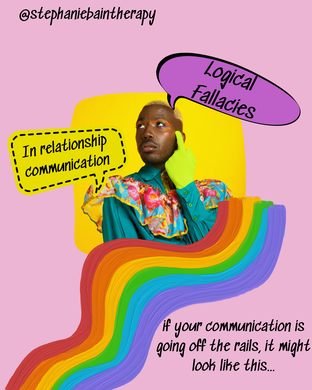|
Is your communication going off the rails? If so it probably includes some of the below. Logical fallacies are errors in reasoning or arguments that can make an argument appear convincing or valid, even though it is flawed or misleading. As a couples therapist in Oakland, CA, I see logical fallacies start to heat up when couples become more dysregulated. Strawman The strawman fallacy occurs when someone misrepresents or distorts their partner's argument or position, creating a weaker or exaggerated version of it. It can go like this: Partner A: "I think we should consider saving more money and cutting down on unnecessary expenses. It would help us achieve our financial goals." Partner B (using strawman): "So, you're saying we should never enjoy ourselves and live like hermits? You just want to take away all the fun from our lives!" Yeesh! To maintain healthy communication within a romantic relationship, it is important to actively listen, seek clarification when needed, and avoid misrepresenting or distorting the other person's arguments. By misrepresenting the other person's arguments or positions, the strawman fallacy can lead to a back-and-forth exchange of frustrations and counter-arguments. This cycle of misrepresentation and defensiveness can make it challenging to find common ground and resolve conflicts constructively. Tu Quoque (Deflection) Ooooh...Latin. I would normally refer to this as "deflection" and is also called the "you too" fallacy or the "appeal to hypocrisy. When one partner employs Tu Quoque in response to criticism or concerns raised by the other partner, it deflects responsibility from addressing the original issue at hand. Instead of engaging in open dialogue and problem-solving, the focus shifts to the perceived wrongdoing of the accuser, which can hinder effective communication and conflict resolution. It often goes like this: Partner A: I get frustrated when dishes are left in the sink Partner B: Okay, but what about how you leave shoes everywhere? This escalates conflicts within a relationship. It often leads to a back-and-forth exchange of accusations and counter-accusations, where both partners become defensive and attempt to prove the other person's hypocrisy. This cycle of defensiveness and deflection can prevent the discussion from progressing towards understanding and resolution. This is a classic ping pong versus catch version of a conversation. The use of Tu Quoque often prevents meaningful resolution of conflicts or issues within the relationship. Instead of addressing the root causes and finding mutually satisfactory solutions, the conversation becomes mired in accusations and counter-accusations. Black-or-White Thinking Black and white thinking, also known as dichotomous thinking or all-or-nothing thinking, is a cognitive distortion where individuals perceive situations or concepts as being only one extreme or the other, with no room for shades of gray or complexity. It goes like this: Partner A: "You never listen to me! You always prioritize your own needs and ignore mine. It's like you don't care about our relationship at all." This type of communication can lead to polarization and defensiveness. Partner B may feel attacked and unfairly portrayed, causing them to respond with counter-accusations or become defensive themselves. The conversation becomes focused on proving or disproving the extreme claims rather than addressing the underlying concerns and finding constructive solutions. Parter A is not going to get what they want and Partner B is going to be pisses! Encouraging open-mindedness, empathy, and flexibility can help partners navigate conflicts with a more nuanced understanding and seek collaborative solutions. Recognizing and challenging black and white thinking patterns can promote healthier communication, enhance mutual understanding, and foster a more harmonious relationship. Moving the Goalposts Moving the goalposts refers to the act of changing or shifting the expectations or requirements. This can happen in a single conversation. It goes like this: Partner A brings up problem Partner B offers a solution Partner A ignores solution offered, adjusts or changes the problem In more detail, it can look like this:
Usually the actual problem isn't just "the problem," but instead feeling unsafe, insecure, or uncomfortable in the relationship. Until you find the core feelings and needs, the conversation and the moving goalposts will not make anyone feel better. False Dilemma or False Dichotomy The logical fallacy of false dichotomy, also known as false dilemma or either-or fallacy, occurs when someone presents a limited number of options as the only possible choices, even though there may be other valid alternatives. It goes like this: Partner A: "Either you invite me to come along to your plans with your friends, or you don't care about our relationship at all!" False dichotomy restricts the available choices in a discussion or argument to only two extremes. This can limit the exploration of other possibilities or potential compromises that could be beneficial to both partners. False dichotomy fails to acknowledge the complexity and intricacies of relationship dynamics. By disregarding the nuances, it can prevent partners from fully understanding and addressing the underlying concerns or underlying causes of conflicts. False dichotomy can lead to communication breakdowns within a relationship. If partners feel forced to choose between two extreme positions, they may become defensive, rigid, or unwilling to engage in open and honest dialogue. This hinders effective communication and prevents the exploration of shared interests or collaborative solutions. Instead, partner should discuss their individual needs and work towards finding a compromise that respects both partners' desires and what benefits the relationships. By broadening the range of choices and considering more nuanced possibilities, they can foster a healthier and more productive conversation that promotes understanding, empathy, and mutually satisfying solutions. Mind Projection Fallacy The mind projection fallacy is a cognitive bias that occurs when individuals assume that others think or perceive the world in the same way they do. When individuals project their own thoughts, beliefs, and perspectives onto their partners, they may fail to empathize with their partner's unique experiences and viewpoints. This can lead to a lack of understanding and hinder effective communication, as partners may not feel truly heard or validated. It goes like this: Partner A: "I can tell you're mad at me. I know I messed up, and I can sense your anger." In this example, Partner A is presuming that Partner B feels a certain way (angry) based on their own internal projection. Partner A assumes that because they would feel angry in a similar situation, Partner B must also be feeling the same way. To address the impact of the mind projection fallacy, it is important for partners to communicate openly and avoid making assumptions based on their own projections. Rather than assuming they know how their partner feels, they can express their observations and concerns while giving their partner space to share their own perspective. Creating a safe and non-judgmental environment allows for genuine understanding and the opportunity to address any potential misunderstandings. Nirvana Fallacy The Nirvana fallacy is a logical fallacy where a perfect solution or ideal outcome is presented as the only acceptable option, disregarding more realistic or practical alternatives. The Nirvana fallacy can lead to the establishment of unrealistic expectations within a relationship. By insisting on an idealized outcome or solution, partners may overlook the complexities and challenges that come with real-life relationships. This can create a sense of dissatisfaction or disappointment when reality doesn't meet the impossibly high standards set by the fallacy. It can go like this: Partner A: "I will make sure to limit my gaming time when we're together" Partner B: "But I feel uncomfortable that you game at all!" The Nirvana fallacy tends to dismiss incremental progress or smaller steps toward improvement. It dismisses the value of gradual changes and focuses solely on an unattainable state of perfection. This can discourage partners from acknowledging and appreciating the positive changes and growth that occur throughout the relationship. If partners believe that anything less than a perfect outcome is unacceptable, they may feel constantly dissatisfied or like they are falling short. This can lead to feelings of self-doubt, frustration, and a negative impact on self-esteem. Looking from a trauma therapist in Oakland, CA? Learn more here. Looking for a queer couples therapist in Oakland, CA? Learn more here. Relationship communication missteps
0 Comments
Leave a Reply. |
AuthorStephanie Bain, LMFT Archives
April 2024
Categories
All
***Resources are not a substitute for therapy and are not intended for making diagnoses or providing treatment. Not all practices and tools are suitable for every person. Please discuss exercises, practices, and tools with your individual therapist or health care provider.
|


 RSS Feed
RSS Feed